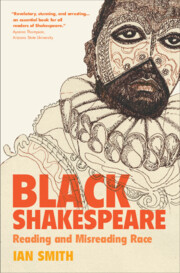Chapter 5 - We Are Othello
Published online by Cambridge University Press: 08 September 2022
Summary
An intense public debate over the deaths of unarmed black persons has emerged at a time when the thesis of a postracial, colorblind America had inserted itself into mainstream thinking as evidence of the growing sentiment to move beyond race and erase its explicit, violent history. Among the findings arising from these killings is the split in the public reaction along distinctly racial lines. Othello’s dying speech raises related concerns insofar as he is anxiously aware of the possible outcome of having a white narrator tell his story. Such a narrator is a prototype for the modern scholar in a majority white field like Shakespeare studies who must confront new empirical data on whites’ diminished capacity to perform cross-racial reading and identification. Hazlitt and other critics appear to have little difficulty affirming that, “It is we who are Hamlet,” but the same has not been true of black Othello. By contrast, the chapter’s appeal, “We are Othello,” is meant to disrupt the silence around whiteness, to make visible and productively politicize the subject identities of critical practitioners in the field, and issue a call for a transformative, antiracist scholarship.
- Type
- Chapter
- Information
- Black ShakespeareReading and Misreading Race, pp. 156 - 181Publisher: Cambridge University PressPrint publication year: 2022

